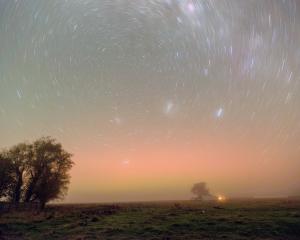Dr Molteno, who is a senior lecturer in the University of Otago physics department, is heading a team developing a low-cost radio telescope which he hopes will be replicated by schools and individuals throughout the country.
But he is concerned such outreach efforts, including those by the Government, face an uphill battle against a culture he says does not value science highly enough.
The radio telescope, which will be built in the Benmore Range, near Twizel, will use common GPS receivers as antennae, enabling the telescope to study little-understood energy flashes in the upper atmosphere. The university researchers are developing revolutionary mathematical processes - inference algorithms - to turn the data into images.
Each radio telescope would cost about $1000 to build and would be able to contribute to the research.
''High school science education has a bit of an uphill battle because our heroes aren't scientists,'' Dr Molteno said.
''Our culture sends a certain message to kids, so it's not surprising we're excellent at rugby.''
Even government initiatives such as this year's National Science Challenges publicity campaign would struggle to make headway, he said.
''There is a political will, but our culture isn't right for it,'' he said.
Science and Innovation Minister Steven Joyce acknowledged the university team's potentially ''invaluable'' work on inference algorithms.
The Government was making headway, he said.
''We are seeing a shift, with more people last year taking up science-based study at university than in 2011,'' Mr Joyce said. Science was essential to addressing some of the key issues facing New Zealand, he said.
''It is also both a driver of economic growth and a strong platform for evidence-based decision making across society.''
The publicity campaign resulted in 138 submissions from the public, 580 votes for illustrative challenges on the website, and 616 further comments and ideas.
Cabinet is expected to make a decision on the final National Science Challenges this month.












